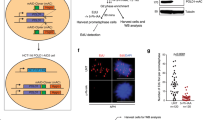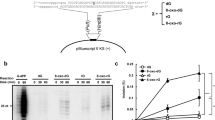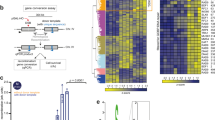Abstract
The p21Cdn1 protein (cip1/waf1/sdi1) plays an important role as an inhibitor of mammalian cell proliferation in response to DNA damage. By interacting with and inhibiting the function of cyclin-Cdk complexes, p21 can block entry into S phase. p21 can also directly inhibit replicative DNA synthesis by binding to the DNA polymerase sliding clamp factor PCNA. When cells are damaged and p21 is induced, DNA nucleotide excision repair (NER) continues, even though this pathway is PCNA-dependent. We investigated features of p21-resistant NER using human cell extracts. A direct end-labelling approach was used to measure the excision of damaged oligonucleotides by NER and no inhibition by p21 was found. By contrast, filling of the ∼30 nt gaps created by NER could be inhibited by pre-binding p21 to PCNA, but only when gap filling was uncoupled from incision. Binding p21 to PCNA could also inhibit filling of model 30 nt gaps by both purified DNA polymerases δ and ε. When p21 was incubated in a cell extract before addition of PCNA, inhibition of repair synthesis was gradually relieved with time. This incubation gives p21 the opportunity to associate with other targets. As p21 blocks association of DNA polymerases with PCNA but does not prevent loading of PCNA onto DNA, repair gap filling can occur rapidly as soon as p21 dissociates from PCNA. A synthetic PCNA-binding p21 peptide was an efficient inhibitor of NER synthesis in cell extracts.
This is a preview of subscription content, access via your institution
Access options
Subscribe to this journal
Receive 50 print issues and online access
$259.00 per year
only $5.18 per issue
Buy this article
- Purchase on Springer Link
- Instant access to full article PDF
Prices may be subject to local taxes which are calculated during checkout
Similar content being viewed by others
Author information
Authors and Affiliations
Rights and permissions
About this article
Cite this article
Shivji, M., Ferrari, E., Ball, K. et al. Resistance of human nucleotide excision repair synthesis in vitro to p21Cdn1. Oncogene 17, 2827–2838 (1998). https://doi.org/10.1038/sj.onc.1202352
Received:
Accepted:
Published:
Issue Date:
DOI: https://doi.org/10.1038/sj.onc.1202352
Keywords
This article is cited by
-
Hepatitis B virus X protein impedes the DNA repair via its association with transcription factor, TFIIH
BMC Microbiology (2011)
-
Sequential recruitment of the repair factors during NER: the role of XPG in initiating the resynthesis step
The EMBO Journal (2008)
-
P21Cip1/WAF1 downregulation is required for efficient PCNA ubiquitination after UV irradiation
Oncogene (2006)
-
Long-patch base excision repair of apurinic/apyrimidinic site DNA is decreased in mouse embryonic fibroblast cell lines treated with plumbagin: involvement of cyclin-dependent kinase inhibitor p21Waf-1/Cip-1
Oncogene (2002)
-
p21waf1/cip1-null human fibroblasts are deficient in nucleotide excision repair downstream the recruitment of PCNA to DNA repair sites
Oncogene (2001)



